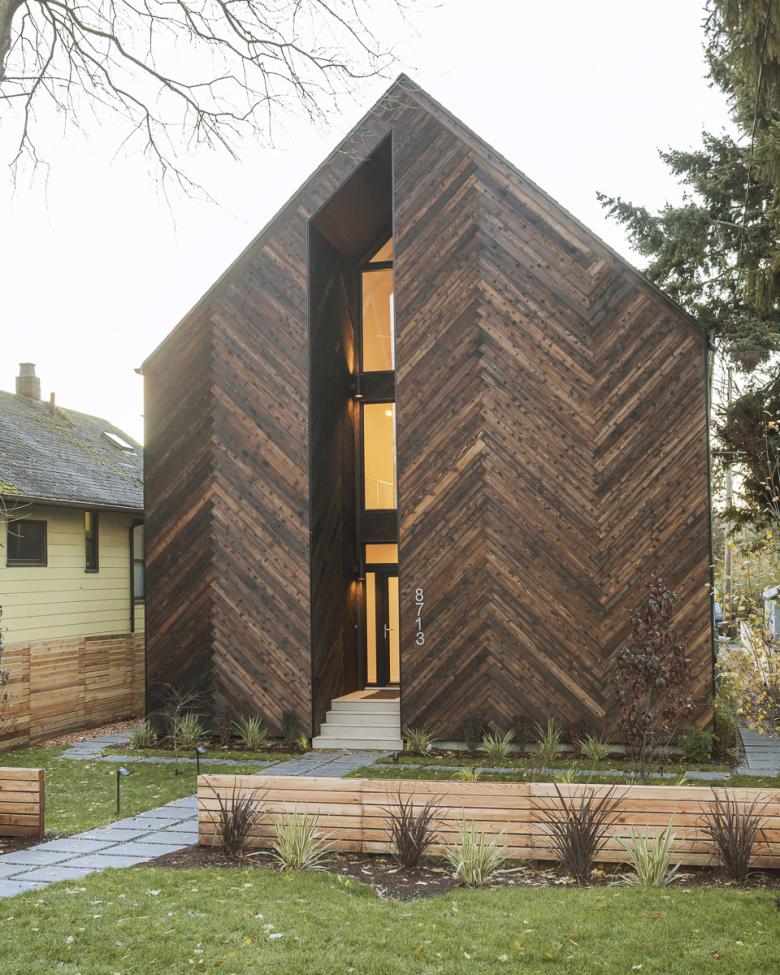Palatine Passive
17. octubre 2016
The Passive House standard, first developed in Germany in the 1990s, has led to tens of thousands of highly energy efficient buildings, most of them in and around Germany. Its popularity in the United States has been slow, but in recent years the number of Passive House-certified projects (mainly single-family houses) has accelerated. A striking example is found in Seattle's Greenwood neighborhood, a wood-clad house designed by Malboeuf Bowie Architecture. Tiffany Bowie answered a few questions about Palatine Passive.
What were the circumstances of receiving the commission for this project?
The house was commissioned by a family member looking to build a passive home within a set budget.
Please provide an overview of the project.
Palatine Passive is an energy-efficient-driven project for a homeowner who is a retired energy consultant. The two level structure includes 3 bedrooms, 2.5 bathrooms as well as a loft. The open two-car carport doubles as a shelter for outdoor gatherings. The home was designed to meet Passive House Certification and was officially certified as a Passive House by PHIUS (Passive House Institute US) in April 2016.
What are the main ideas and inspirations influencing the design of the building?
We were inspired by the simplicity of Scandinavian design and architecture. The interiors were driven by an open plan concept and a 'lightness' in the materials selection. We liked the idea of expressing a very simple form for the structure, while adding specific details and textures to the exterior form and window trim. Additionally, the method Japanese shou sugi ban was of great interest interest to us for aesthetic and durability reasons. We decided to treat the cedar on the east facade with shou sugi ban to provide a lasting treatment to the siding. The rest of the structure was clad with a factory finished fiber cement panel that will not require paint for 15 or more years.
How does the design respond to the unique qualities of the site?
The site is an urban infill lot in an up an coming neighborhood in Greenwood. The design challenge was to provide adequate lighting, natural light and within the parameters of PHIUS while maintaining privacy. The east facade facing a busy street allows ample light into the interiors from designing a jog in the structure. Large floor to ceiling windows are placed strategically to allow a light filled space that is private from the street.
How did the project change between the initial design stage and the completion of the building?
Originally the project was designed as a three-story residence. Due poor soils on the site, the excavation was limited to 30”. Due to zoning height restrictions, we changed the design to two floors with a loft.
Was the project influenced by any trends in energy-conservation, construction, or design?
Passive House influenced much of the overall form and window placement. The volume was designed to provide optimal efficiency without compromising important design features such as high ceilings and ample light. The floor plan remained as open as possible to allow light from various locations to penetrate the spaces.
What products or materials have contributed to the success of the completed building?
Passive House is a fully integrated process where each material and system contributes to the success of the entire project. This includes cladding, insulation, wall assemblies, roofing assemblies, and the HVAC systems, as well as the the floor plan layout.
Email interview conducted by John Hill.
Palatine Passive
2015Greenwood, Seattle, Washington
Client
DL Bowie
Architect
Malboeuf Bowie Architecture
Seattle, WA
Design Principal
Tiffany Bowie
Project Team
Tiffany Bowie & Joe Malboeuf of Malboeuf Bowie Architecture
Structural Engineer
Carissa Farkas Structural Engineering
Landscape Architect
Blue & Yellow Builders LLC
Inteiror & Lighting Design
Malboeuf Bowie Architecture
Contractor
Blue & Yellow Builders LLC
Construction Manager
Tiffany Bowie of Blue & Yellow Builders LLC
Passive House Consultant
Dan Whitmore of Hammer and Hand
Triple-pane Windows
Klearwall
Heat Recovery Ventilator
Zhender
Heat Pump
Mitsubishi
Energy Monitoring System
Kirio
Site Area
6,000 sf
Building Area
2,700 sf
Photography
Shea Pollard Photography
Drawings
Malboeuf Bowie Architecture











